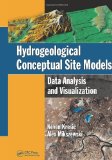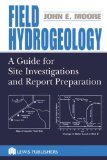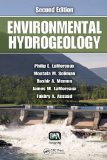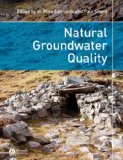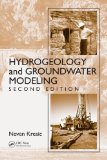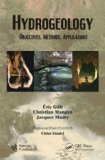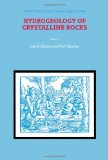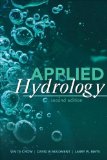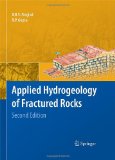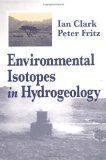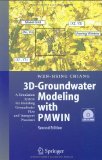
|
3D-Groundwater Modeling with PMWIN: A Simulation System for Modeling Groundwater Flow and Transport Processes
This book offer a complete simulation system for modeling groundwater flow and transport processes. The companion full-version software (PMWIN) comes with a professional graphical user-interface, supported models and programs and several other useful modeling tools. Tools include a Presentation Tool, a Result Extractor, a Field Interpolator, a Field Generator, a Water Budget Calculator and a Graphic Viewer. Book targeted at novice and experienced groundwater modelers. |
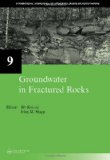
|
Groundwater in Fractured Rocks
The hydrogeologic environment of fractured rocks represents vital natural systems, examples of which occur on every continent. This book discusses key issues, methodologies and techniques in the hydrogeology of fractured rocks, summarizing recent progress and anticipating the outcome of future investigations. Forty-four revised and updated papers were selected from extended abstracts presented at the International Conference on Groundwater in Fractured Rocks, held in Prague in 2003 and these provide a valuable benchmark reference for studies in fractured rock hydrogeology worldwide. Topics include sustainable groundwater development, groundwater protection and management, new and improved approaches to the investigating hydrogeology of fractured systems, understanding of hydrogeologic properties both on local and regional scales, and both quantitative and qualitative aspects of groundwater flow and solute/contaminant transport. |
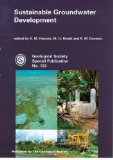
|
Sustainable Groundwater Development
Sustainable development of groundwater resources is a key environmental and social issue for the future. To manage groundwater resources sustainably it is necessary to include protection of springs, river flows and water levels dependent on groundwater discharges, while concurrently maintaining abstractions for water supply and economic benefit. Obtaining this balance between human and environmental needs, and protecting valuable groundwater resources from over-explotation and pollution, presents a challenge to hydrogeologists that is reflected in the approaches and case studies contained in this volume. |
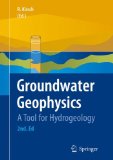
|
Groundwater Geophysics: A Tool for Hydrogeology
Edited by Reinhard Kirsch, this book demonstrates the use of geophysics for the detection and delineation of groundwater resources. As well as being an excellent reference, it could also be used as a textbook. An addition to the bookshelf of any geophysicist. |
|
Hydrogeological Conceptual Site Models: Data Analysis and Visualization
A reference for students, researchers, and environmental professionals, Hydrogeological Conceptual Site Models: Data Analysis and Visualization explains how to develop effective conceptual site models, perform advanced spatial data analysis, and generate informative graphics for applications in hydrogeology and groundwater remediation. Written by expert practitioners, this full-color book illustrates how fundamental hydrogeological concepts are translated into quantitative, high-resolution computer visualizations. In addition, the authors discuss topics not typically covered in conventional textbooks, including GIS technology and the relationship between conceptual site models and environmental policy. |
|
Field Hydrogeology- A Guide for Site Investigations and Report Preparation
In recent years, the focus in groundwater studies has expanded to also include groundwater contamination and remediation studies as a part of resource evaluations. While there are other books on the subject, Field Hydrogeology-A Guide for Site Investigations and Report Preparation provides the first integrated presentation of the American Society of Testing Materials (ASTM) standards, US Geological Survey (USGS), and US Environmental Protection Agency (EPA) field techniques. It also includes access to a Web site that contains software for designing aquifer tests and aquifer-recharge experiments. Written by an author with more than 40 years of experience in hydrology and geology, this reference treats the subject from a field standpoint. Useful as a field guide and a textbook, it contains standard methods for planning and undertaking hydrogeologic investigations. It incorporates case studies, contains a glossary of field-hydrogeology technical terms, and provides a detailed list of ASTM standards and key hydrologic Web sites. |
|
Groundwater: Resource Evaluation, Augmentation, Contamination, Restoration, Modeling and Management
This book provides comprehensive coverage on the assessment and management of groundwater. It contains the work of international experts in the field of groundwater resource evaluation, characterization, augmentation, restoration, modeling and management. |
|
Environmental Hydrogeology
Headlines continue to blare news of climate change, tangential catastrophic events, and dwindling energy resources. Written by respected practitioners, and geared to practitioners and students, Environmental Hydrogeology, Second Edition explores the role that hydrogeology can play in solving challenging environmental problems. |
|
Natural Groundwater Quality
The European Water Framework Directive forms the basic legislation for the protection of the European aquatic environment. The Groundwater Directive (GD) was adopted in 2006 to supplement the Water Framework Directive (WFD) and to deal with the specific questions of groundwater quality and to ensure good status of groundwater. At the same time there is still a poor perception of the importance of groundwater by many people involved in civic management and public policy. Against this background a consortium of European scientists conducted detailed studies of water quality in Europe, focusing on the natural baseline quality of groundwater as the basis for understanding geochemical processes in aquifers, and providing a framework for defining what constitutes pollution. This text is the result of these important studies, and constitutes a key reference on natural water quality of aquifers. It presents a series of thematic chapters together with chapters on representative groundwater systems in Europe which illustrate the main processes and evolution of water quality. |
|
Hydrogeology and Groundwater Modeling
Coupling the basics of hygrogeology with analytical and numerical modeling methods, Hydrogeology and Groundwater Modeling, Second Edition provides detailed coverage of both theory and practice. Written by a leading hydrogeologist who has consulted for industry and environmental agencies and taught at major universities around the world, this unique book fills a gap in the groundwater hydrogeology literature. With more than 40 real-world examples, the book is a source for clear, easy-to-understand, and step-by-step quantitative groundwater evaluation and contaminant fate and transport analysis, from basic laboratory determination to complex analytical calculations and computer modeling. It provides more than 400 drawings, graphs, and photographs, and a variety of useful tables of all key groundwater parameters, as well as lucid, straightforward answers to common hydrogeological problems. Reflecting nearly ten years of new scholarship since the publication of the bestselling first edition, this second edition is wider in focus with added and updated examples, figures, and problems, yet still provides information in the author's trademark, user-friendly style. No other book offers such carefully selected examples and clear, elegantly explained solutions. The inclusion of step-by-step solutions to real problems builds a knowledge base for understanding and solving groundwater issues. |
|
Hydrogeology: Objectives, Methods, Applications
Hydrogeology, the science of groundwater, requires a multidisciplinary approach involving many other sciences: surface hydrology, climatology, geology, geography, physics, chemistry, biology, and more. This book takes a broad view, considers water as a single entity, and presents many examples illustrating the variety of existing hydrogeological problems and the diverse scientific, technical, and social approaches used in resolving them. It is intended primarily for students of Earth Sciences, Environmental Sciences, and Physical Geography. It will also be useful to all players involved in water-related issues: hydrogeologists, geologists, soil scientists, agronomists, civil engineers, and developers. |
|
Hydrogeology of Crystalline Rocks
Hydrogeology of Crystalline Rocks deals with deep groundwater in the granite and gneiss basement of the continents. It has become evident during the past years that highly mineralized water is present in an interconnected fracture network of the basement. Thus, the upper part of the crust of the continents can be viewed as an aquifer and investigated with tools common in hydrogeology. This book presents accounts on water-conducting features of crystalline rocks and summarizes the hydraulic properties of the basement. The volume includes reviews, new data and research on the often remarkable chemical composition of deep groundwater. Microbial processes in the deep basement aquifer are probably more important than previously thought. Two contributions focus on this recent extension of research of the biosphere to greater depth in the Earth. This book represents the first multidisciplinary and integrated account of deep groundwater hydrology in crystalline basement. It is of interest to hydrologists and hydrogeologists working with water in crystalline rocks, but also to solid earth geophysicists, geochemists and petrologists with an interest in fluids in the crust. Scientists involved in nuclear waste disposal programs and geothermal energy development will find a wealth of stimulating ideas in this volume. |
|
Applied Hydrology
Applied Hydrology, Second Edition retains the successful outline of this classic text while adding new material on physical hydrologic modeling to cover advances in that field of hydrology. New coverage includes the advances in solving hydrology problems through the use of new methodologies such as GIS technology. The book is divided into three parts: Hydrologic Processes; Hydrologic Analysis; and Hydrologic Design, where most of the revisions occur. |
|
Applied Hydrogeology of Fractured Rocks
Hydrogeology is a topical and growing subject as the earth's water resources become scarcer and more vulnerable. More than half of the surface area of continents is covered with hard rocks of low permiability. This book deals comprehensively with the fundamental principles for understanding the hydrogeological characteristics of rocks, as well as exploration techniques and assessment. It also provides in depth discussion on structural mapping, remote sensing, geophysical exploration, GIS, groundwater flow modelling and contaminant transport, field hydraulic testing including tracer tests, groundwater quality, geothermal reservoirs, managed aquifer recharge, and resources assessment and management. Hydrogeological aspects of various lithology groups, including crystalline rocks, volcanic rocks, carbonate rocks and clastic formations have been dealt with separately, using and discussing examples from all over the world. It will be an invaluable text book cum reference source for postgraduate students, researchers, exploration scientists and engineers engaged in the field of groundwater development in fractured rocks. Applied Hydrogeology of Fractured Rocks - Second Edition is thoroughly revised and extended with a new chapter, updated sections, many new examples, and expanded and updated references.
|
|
Environmental Isotopes in Hydrogeology
Groundwater is an increasingly important resource to human populations around the world, and the study and protection of groundwater is an essential part of hydrogeology - the subset of hydrology that concentrates on the subsurface. Environmental isotopes, naturally occurring nuclides in water and solutes, have become fundamental tools for tracing the recharge, history, and contamination of groundwater. |






